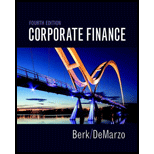
Corporate Finance (4th Edition) (Pearson Series in Finance) - Standalone book
4th Edition
ISBN: 9780134083278
Author: Jonathan Berk, Peter DeMarzo
Publisher: PEARSON
expand_more
expand_more
format_list_bulleted
Question
Chapter 17.2, Problem 1CC
Summary Introduction
To discuss: Whether the price that rises under the repurchase of firm’s own shares, because of a decrease in the supply of outstanding shares is true or false.
Introduction:
Share repurchase is an alternative method used to pay the cash to the company’s investors by the way of buy back of shares. When a company purchases its own shares, which remains outstanding, it is known as stock repurchases.
Expert Solution & Answer
Want to see the full answer?
Check out a sample textbook solution
Students have asked these similar questions
Please help me with this , with tge store name puebleo in St. Thomas US virgin islands
I would like to expand pueblo in S5. Thomas virgin islands to Spain. Please help with an analysis expansion.
Please help me with this, guidelines for the super market pueblo in St. Thomas US virgin islands
Chapter 17 Solutions
Corporate Finance (4th Edition) (Pearson Series in Finance) - Standalone book
Ch. 17.1 - Prob. 1CCCh. 17.1 - Prob. 2CCCh. 17.2 - Prob. 1CCCh. 17.2 - In a perfect capital market, how important is the...Ch. 17.3 - Prob. 1CCCh. 17.3 - Prob. 2CCCh. 17.4 - Prob. 1CCCh. 17.4 - Prob. 2CCCh. 17.5 - Is there an advantage for a firm to retain its...Ch. 17.5 - Prob. 2CC
Ch. 17.6 - Prob. 1CCCh. 17.6 - Prob. 2CCCh. 17.7 - Prob. 1CCCh. 17.7 - Prob. 2CCCh. 17 - Prob. 1PCh. 17 - ABC Corporation announced that it will pay a...Ch. 17 - Prob. 3PCh. 17 - RFC Corp. has announced a 1 dividend. If RFCs...Ch. 17 - Prob. 5PCh. 17 - KMS Corporation has assets with a market value of...Ch. 17 - Natsam Corporation has 250 million of excess cash....Ch. 17 - Suppose the board of Natsam Corporation decided to...Ch. 17 - Prob. 9PCh. 17 - Suppose BE Press paid dividends at the end of each...Ch. 17 - The HNH Corporation will pay a constant dividend...Ch. 17 - Prob. 12PCh. 17 - Prob. 13PCh. 17 - Prob. 14PCh. 17 - Suppose that all capital gains are taxed at a 25%...Ch. 17 - Prob. 16PCh. 17 - Prob. 17PCh. 17 - Prob. 18PCh. 17 - Prob. 19PCh. 17 - A stock that you know is held by long-term...Ch. 17 - Clovix Corporation has 50 million in cash, 10...Ch. 17 - Assume capital markets are perfect. Kay Industries...Ch. 17 - Redo Problem 22., but assume that Kay must pay a...Ch. 17 - Harris Corporation has 250 million in cash, and...Ch. 17 - Redo Problem 22, but assume the following: a....Ch. 17 - Prob. 26PCh. 17 - Use the data in Table 15.3 to calculate the tax...Ch. 17 - Explain under which conditions an increase in the...Ch. 17 - Why is an announcement of a share repurchase...Ch. 17 - AMC Corporation currently has an enterprise value...Ch. 17 - Prob. 31PCh. 17 - Prob. 32PCh. 17 - Explain why most companies choose to pay stock...Ch. 17 - Prob. 34PCh. 17 - Prob. 35P
Knowledge Booster
Similar questions
- Need the below table filled out for Short-term debt %, Long-term debt $,%, Common equity $,% and Total capital $,%. Market Value Capital Structure Suppose the Schoof Company has this book value balance sheet: Current assets $30,000,000 Current liabilities $20,000,000 Notes payable 10,000,000 Fixed assets 70,000,000 Long-term debt 30,000,000 Common stock (1 million shares) 1,000,000 Retained earnings 39,000,000 Total assets $100,000,000 Total liabilities and equity $100,000,000 The notes payable are to banks, and the interest rate on this debt is 11%, the same as the rate on new bank loans. These bank loans are not used for seasonal financing but instead are part of the company's permanent capital structure. The long-term debt consists of 30,000 bonds, each with a par value of $1,000, an annual coupon interest rate of 6%, and a 15-year maturity. The going rate of interest on new long-term debt, rd, is 12%, and this is the…arrow_forwardNed assistance with Q3 and Q4 below? Cost of Equity The earnings, dividends, and stock price of Shelby Inc. are expected to grow at 6% per year in the future. Shelby's common stock sells for $21 per share, its last dividend was $1.00, and the company will pay a dividend of $1.06 at the end of the current year. Using the discounted cash flow approach, what is its cost of equity? Round your answer to two decimal places. 11.06 % If the firm's beta is 1.3, the risk-free rate is 8%, and the expected return on the market is 11%, then what would be the firm's cost of equity based on the CAPM approach? Round your answer to two decimal places. 11.90% If the firm's bonds earn a return of 9%, then what would be your estimate of rs using the own-bond-yield-plus-judgmental-risk-premium approach? (Hint: Use the mid-point of the risk premium range.) Round your answer to two decimal places. % On the basis of the results of parts a–c, what would be your estimate of Shelby's cost of equity?…arrow_forwardWhat monthly compounded interest rate would Second National Bank need to pay on savings deposits to provide an effective rate of 6.2%?arrow_forward
- Hello tutor this is himlton biotech problem.arrow_forwardYan Yan Corp. has a $2,000 par value bond outstanding with a coupon rate of 4.7 percent paid semiannually and 13 years to maturity. The yield to maturity of the bond is 5.05 percent. What is the dollar price of the bond?arrow_forwardA trip goa quesarrow_forward
arrow_back_ios
SEE MORE QUESTIONS
arrow_forward_ios
Recommended textbooks for you
 EBK CONTEMPORARY FINANCIAL MANAGEMENTFinanceISBN:9781337514835Author:MOYERPublisher:CENGAGE LEARNING - CONSIGNMENT
EBK CONTEMPORARY FINANCIAL MANAGEMENTFinanceISBN:9781337514835Author:MOYERPublisher:CENGAGE LEARNING - CONSIGNMENT Cornerstones of Financial AccountingAccountingISBN:9781337690881Author:Jay Rich, Jeff JonesPublisher:Cengage Learning
Cornerstones of Financial AccountingAccountingISBN:9781337690881Author:Jay Rich, Jeff JonesPublisher:Cengage Learning


EBK CONTEMPORARY FINANCIAL MANAGEMENT
Finance
ISBN:9781337514835
Author:MOYER
Publisher:CENGAGE LEARNING - CONSIGNMENT

Cornerstones of Financial Accounting
Accounting
ISBN:9781337690881
Author:Jay Rich, Jeff Jones
Publisher:Cengage Learning